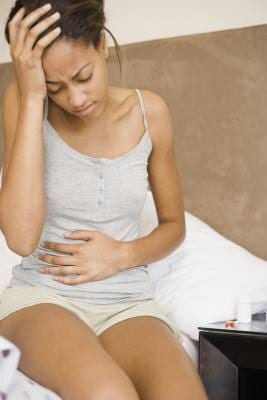When you become pregnant, the first thing your body does is go into hormone production overload, creating the array of hormones necessary to secure your pregnancy and help your baby to grow and to develop. While these hormonal changes rarely have a visible effect, you will certainly feel this chemical change within your body. Because these hormonal changes occur so rapidly after conception, you may begin feeling the effects of these changes before you even realize you are expecting.
Immediate Hormonal Changes
From almost the first instant your body detects the presence of a fertilized embryo, your hormone production goes into overdrive. As Lucile Packard Children’s Hospital reports, pregnant women almost immediately begin producing human chorionic gonadotropin (hCG), a hormone that is only present during pregnancy, human placental lactogen (hPL), which aids in the development of a placenta and allows for lactation, estrogen, which helps maintain the pregnancy and progesterone, which stimulates a thickening of the uterine lining.
Physical Impact of Hormone Change
As these pregnancy-related hormones surge through your body, you will likely see some outward signs that they are doing their job. One of the most noticeable signs of hormone change is breast growth. As your breasts begin to ready themselves for lactation, you may find that you are growing out of your trusty bras at a rapid rate. You may also notice other signs, such as increased blood flow to the skin, which results in the “pregnant glow” and aureola darkening.
Morning Sickness
While some women suffer through morning sickness their entire pregnancy, many feel it most acutely during their first trimester, when their hormones are most in flux. Pregnancy hormone hCG is the culprit to blame for your morning blahs. As your body becomes accustomed to the presence of this new hormone, your sickness will likely subside a bit, and you will begin to feel less like you can’t survive nine whole months.
Hormones and Your Mood
Many women suffer mood swings as a result of the hormonal changes within their bodies during the first trimester, reports KidsHealth. These mood swings are often similar to those experienced during premenstrual syndrome, potentially masking a pregnancy if you weren’t expecting it. Because hormones play a part in brain function, the influx of new hormones that surge through you while your pregnancy is getting established leads your brain to get a little out of whack during this first stage of pregnancy, making your moods difficult to predict at times, much to the chagrin of your partner.
Hormonal Changes in Expectant Fathers
While much attention is paid to the hormone changes that occur within a woman’s body during this time, few consider that men too may be experiencing a hormonal change. As “USA Today” reports, men who are about to become fathers undergo a hormonal change that, while not as severe as those experienced by women, is noticeable. Men begin to produce cortisol, a stress hormone connected to the fight-or-take-flight response. Scientists hypothesize that the production of this hormone in expectant dads is an evolutionary response to the need to protect the new infant who will soon enter the world.





